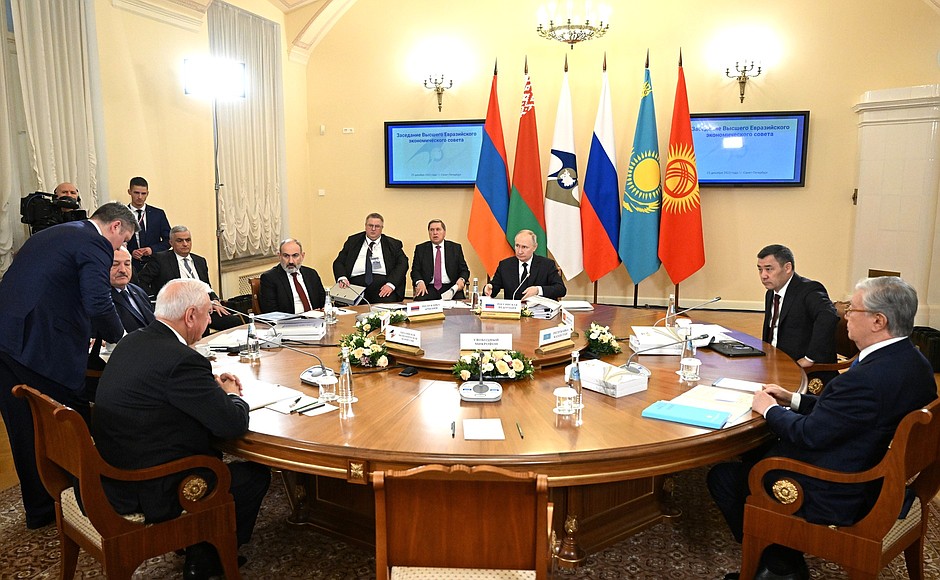
President of Russia Vladimir Putin: Good afternoon, colleagues,
As agreed, we are meeting today in St Petersburg, and I am pleased to welcome you all.
We have a busy agenda. After holding the restricted-format meeting of the Supreme Eurasian Economic Council, we will bring in the delegations and continue our work in a broader format.
Today, we will discuss a range of important, I would even say fundamental, issues related to deepening Eurasian integration. In particular, we are expected to approve a declaration, drafted on the Russian side’s initiative, on the further development of economic processes within our association for the period to 2030 and further to 2045. Essentially, this is a new programme document that includes specific measures to step up the joint efforts in key industries and defines additional areas of interaction, such as the climate agenda, healthcare, tourism, and several others.
Importantly, governments, agencies, and experts from all member countries participated in drafting the declaration. I look forward to us approving the declaration by way of adopting a resolution of the Supreme Eurasian Economic Council.
I would like to especially note that in the run-up to our meeting, a free trade agreement between the EAEU and Iran was signed. This agreement can have a truly significant impact on strengthening the EAEU’s ties with one of the largest and technologically advanced economies in the Eurasian region.
Once the agreement comes into force, practically all categories of goods produced in the Union will obtain duty-free access to the extensive Iranian market with 90 million consumers, and non-tariff barriers will be significantly reduced.
Businesses from our respective countries that engage in active trading with their Iranian partners are interested in this, and the environment for such business cooperation will now be tangibly improved.
Obviously, liberalisation of trade with Iran will give a good additional impetus to the development of the transport-logistics system and transport-logistics routes, such as the North-South international corridor, that connect all our states. It will create prerequisites for the build-up of scientific and production cooperation, tourist and delegation exchanges and contacts between people in general.
During the current meeting, we will also make personnel decisions, primarily endorse a new chair and some members of the Board of the Eurasian Economic Commission. Based on the rotation principle, the position of the Commission’s chair will go to a representative of the Republic of Kazakhstan on February 1, 2024. Today, our friends from Kazakhstan will nominate their candidate for this position.
Due to the expiration of terms of a number of judges of the EAEU Court, candidates for new members of this body have been submitted for our approval. They will start working on January 1, 2024.
Naturally, many other specific issues of economic interaction, customs and tariffs regulations, investment policy and the functioning of the EAEU common markets have also been included in our agenda. Colleagues will have an opportunity to express their views on all problems in our Union’s activities that worry them.
Overall, talking about cooperation in the EAEU, I would like to state with satisfaction that it is progressing very successfully and dynamically, allowing us to more fully tap the economic potential of our nations. We are cooperating on the principles of mutual benefit and respect, as well as consideration of each other’s interests. The Eurasian Union will soon be 10 years old. Over this period, the scale of trade has almost doubled and the aggregate GDP of the EAEU countries has grown from US$1.6 trillion to US$2.5 trillion. We have created deep common markets of goods, services, capital, and workforce, which are operating in line with agreed-upon rules. The main point is that the Eurasian Union has become an authoritative international integration association with an efficient structure and a good foundation. Its work directly contributes to improving the wellbeing and living standards of our people.